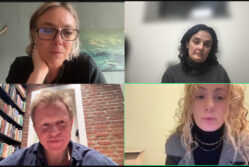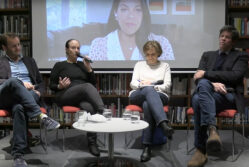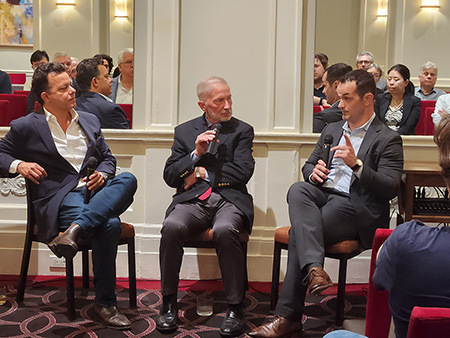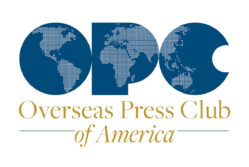Event Coverage Highlight

‘Battlefield Cyber’ Authors Urge More Cooperation to Thwart Digital Attacks
by Chad Bouchard
The co-authors of a new book on international cyber warfare told an OPC audience on Sept. 20 that shortcomings in computer security and digital literacy have left Americans vulnerable to attacks, intrusion and manipulation from countries with sophisticated cyber systems such as China and Russia.
“It’s only just now that we’re waking up to the fact that we’re basically wide open,” said OPC Past President William J. Holstein, who discussed Battlefield Cyber: How China and Russia Are Undermining Our Democracy and National Security along with co-author Michael G. McLaughlin at the Club Quarters book night. “We have not invested the time, the money, or the education in protecting ourselves.”
John Avlon, a vice president of the OPC, moderated the discussion.
The authors argued that, contrary to popular perception, cyber warfare is not merely a fight between hackers and tech security agency departments – it is a societal problem that needs broad public attention.
“If you connect to the internet, you are on the battlefield,” McLaughlin said. “There are no non-combatants. That’s the idea we need to get across, desperately, to everyone who is a part of our society.”
Holstein highlighted recent headlines about cyber attacks, including a New York Times piece in July by David E. Sanger and Julian E. Barnes about Chinese “ticking time bomb” malware that was discovered deep inside U.S. networks controlling power grids, communications systems and water supplies for military bases. He also cited a recent report from Microsoft indicating a network of Chinese-controlled fake social media accounts are using artificial intelligence to influence U.S. voters and spread disinformation.
“We’re on the receiving end right now of a full-scale assault on our democracy, on our decision-making systems, and on the very definition of who we are as Americans.”
McLaughlin said cyber attacks won’t come in the form of a digital Pearl Harbor or 9-11, because that isn’t how adversaries like China or Russia operate. He said a big challenge in countering cyber warfare is that such attacks are poorly defined and sidestep conventional rules of engagement.
“If the Russians conduct a wiperware attack, hypothetically, against Ukrainian networks, but cause no physical damage, is that an attack? Under international law, the answer is no,” McLaughlin said. Wiperware is a type of attack intended to erase memory and destroy systems.
McLaughlin noted that social platforms like TikTok, which he called the single greatest propaganda tool ever created, can be mined for data on its 140 million American users and then exploited to develop individually tailored attacks to amplify political and cultural divides.
Holstein and McLaughlin urged more public-private partnerships to boost cyber security, in which government agencies would provide information about threats to tech companies, so they can better identify and address vulnerabilities. Currently, companies tend to resist government requests for data and lobby against increases in regulation.
“We need some creative thinking in terms of how to accomplish national goals without violating the gap between the public and private sector,” Holstein said. “Our sheer pluralism is one of the reasons why we are so vulnerable.”
Battlefield Cyber is available for purchase on Amazon via this link.
Click the window below to watch a playlist of clips on the OPC’s YouTube channel.
Related Events




